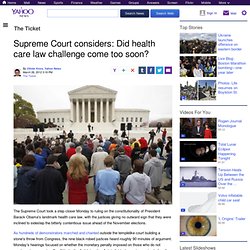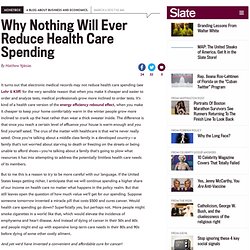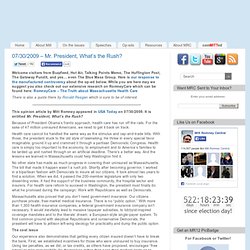

Study: U.S. Health Care Wastes $750B. Supreme Court considers: Did health care law challenge come too soon? The Supreme Court took a step closer Monday to ruling on the constitutionality of President Barack Obama's landmark health care law, with the justices giving no outward sign that they were inclined to sidestep the bitterly contentious issue ahead of the November elections.

As hundreds of demonstrators marched and chanted outside the templelike court building a stone's throw from Congress, the nine black-robed justices heard roughly 90 minutes of argument. Monday's hearings focused on whether the monetary penalty imposed on those who do not purchase insurance is a "tax. " Under the Anti-Injunction Act, individuals must pay a tax before they can challenge it in court. This would require the court to hold off ruling on the law until it is in full effect in 2015.
Some experts have called the Anti-Injunction Act a face-saving escape clause allowing the court to set aside the explosive issue until after the elections, but the justices themselves did not seem to want to avoid the fray. Why Nothing Will Ever Reduce Health Care Spending. It turns out that electronic medical records may not reduce health care spending (see Lohr & Kliff) for the very sensible reason that when you make it cheaper and easier to order and analyze tests, medical professionals grow more inclined to order tests.

It's kind of a health care version of the energy efficiency rebound effect, when you make it cheaper to keep your home comfortably warm in the winter people grow more inclined to crank up the heat rather than wear a thick sweater inside. The difference is that once you reach a certain level of affluence your house is warm enough and you find yourself sated. The crux of the matter with healthcare is that we're never really sated. But to me this is a reason to try to be more careful with our language.
If the United States keeps getting richer, I anticipate that we will continue spending a higher share of our income on health care no matter what happens in the policy realm. Mitt Romney's Advice For ObamaCare: Look At RomneyCare. 07/30/09 - Mr. President, What's the Rush? Welcome visitors from Buzzfeed, Hot Air, Talking Points Memo, The Huffington Post, The Gateway Pundit, and yes… even The Blue Mass Group.

Here is our response to the manufactured controversy about the op-ed below. While you are here may we suggest you also check out our extensive research on RomneyCare which can be found here: RomneyCare – The Truth about Massachusetts Health Care There is also a quote there by Ronald Reagan which is sure to be of interest. This opinion article by Mitt Romney appeared in USA Today on 07/30/2009. It is entitled Mr. Because of President Obama’s frantic approach, health care has run off the rails.
Health care cannot be handled the same way as the stimulus and cap-and-trade bills. No other state has made as much progress in covering their uninsured as Massachusetts. Massachusetts also proved that you don’t need government insurance. The cost issue Our experience also demonstrates that getting every citizen insured doesn’t have to break the bank. The high cost of American health care in one chart. Why an MRI costs $1,080 in America and $280 in France. View full graphic There is a simple reason health care in the United States costs more than it does anywhere else: The prices are higher.

That may sound obvious. But it is, in fact, key to understanding one of the most pressing problems facing our economy. In 2009, Americans spent $7,960 per person on health care. Our neighbors in Canada spent $4,808. There are many possible explanations for why Americans pay so much more. As it’s difficult to get good data on prices, that paper blamed prices largely by eliminating the other possible culprits. “The United States spends more on health care than any of the other OECD countries spend, without providing more services than the other countries do,” they concluded. On Friday, the International Federation of Health Plans — a global insurance trade association that includes more than 100 insurers in 25 countries — released more direct evidence. Prices don’t explain all of the difference between America and other countries.